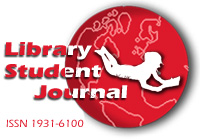 |
A peer-reviewed student publication
of the University at Buffalo Department of Library and Information Studies |
 |
A peer-reviewed student publication
of the University at Buffalo Department of Library and Information Studies |
Editorials (8 results, 1 page) Reader Development as a Core Library Function (editorial) Reader Development is an approach to attracting and supporting library users practiced mainly in England. Rather than continuing the debate over the recreational approach to user services versus the educational approach, the Reader Development approach combines the two in an effort to make the act of reading more enjoyable, and thus attract new users to libraries. Subjects: Users, literacy and reading View in HTML Comments (0) A new context for knowledge creation: letter from the editor, February, 2007 (editorial) Reflecting on the current issue and on how knowledge is created and organized in the digital age, the editor discusses how knowledge is created in the online context. He touches on the debate over the validity of Wikipedia entries, and questions the wisdom of judging a new technology by old standards. Subjects: Information in society View in HTML Comments (0) Accepting Knowledge Management into the LIS fold : (editorial) The goal of this editorial is to describe the emerging stimulus that could drive joint ventures between business, management, and library and information science schools in offering Knowledge Management (KM) curricula. The basis for this thought-piece are modified excerpts from the authors forthcoming dissertation entitled Examination of the Historical Sensemaking Processes Representing the Development of Knowledge Management Curricula in Universities: Case Studies Associated with an Emergent Discipline. Subjects: Knowledge management View in HTML Comments (0) Do we want a perfectly filtered world? (editorial) The author explores the impact of internet filtering in public libraries as compared between the United States and the United Kingdom. Subjects: Censorship View in HTML Comments (0) Interview to interaction: towards a terminology of equality in reference work (editorial) Reference service in librarianship has historically been tied to the reference interview as predominant teaching model. Successful reference encounters involve the mutual respect of both parties as they work towards a common goal. While there are positive traits associated with the reference interview, the term also possesses negative connotations which can influence the contact between librarians and patrons. In an effort to help develop respectful relationships, the author suggests a reclassification of the reference interview as a reference interaction. Subjects: Reference services View in HTML Comments (0) A field for all: letter from the editor, November, 2006 (editorial) Library and information science is a diverse field, with opportunities for professionals of all backgrounds to use their expertise. This issue explores the breadth of activity in the LIS field. Subjects: Theoretical and general aspects of LIS View in HTML Comments (0) Open (and free) for business: letter from the editor, September, 2006 (editorial) The editor-in-chief of Library Student Journal discusses the publishing context in which the journal is emerging. He explores how the Open-Access model of journal publishing challenges the assumptions of the industry. Subjects: Electronic journals View in HTML Comments (0) Why content analysis should be used more in library and information studies research (editorial) Content analysis provides an alternative technique for Library and Information Studies (LIS) research, but despite its effectiveness has been too often ignored. This editorial outlines the basic concepts and procedures of content analysis, then explores and denounces possible causes of its limited application in the LIS field. Subjects: Content analysis View in HTML Comments (2) Your search retrieved 8 results. You are on page 1 of 1. |
Show Brief ResultsRelated SubjectsElectronic journalsTraining Knowledge management Content analysis Information retrieval Reference services Internet (and World Wide Web) Censorship Intellectual freedom Information dissemination and diffusion Browse Subjects Search HelpSubjects: Search for that subject Authors: Search for their work More Search Help |